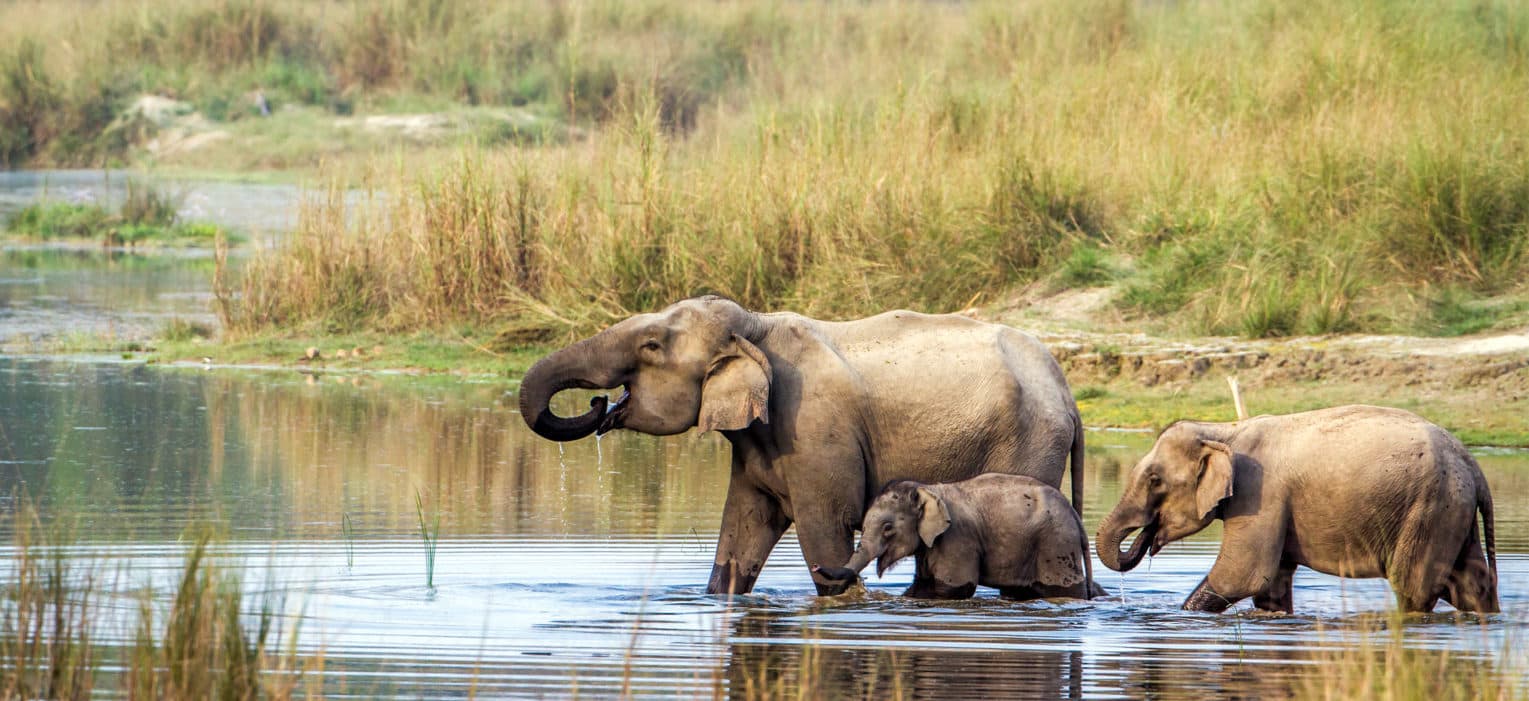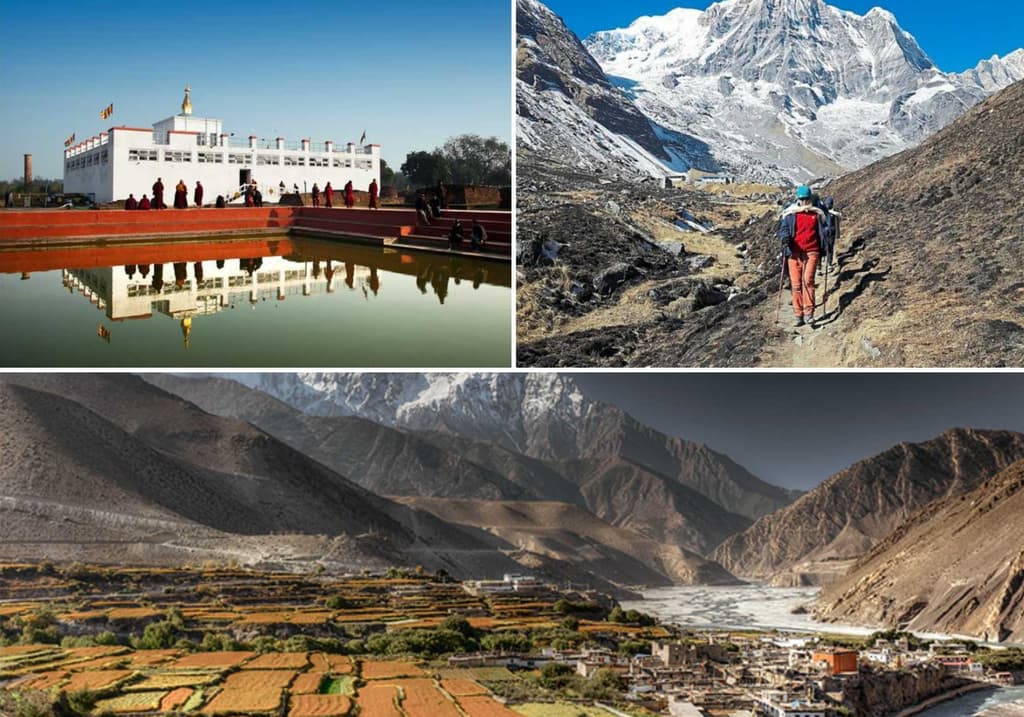Chitwan National Park-The Unlimited Wilderness
Chitwan National Park, established in 1973, stands as the oldest national park in Nepal. This distinguished sanctuary expanded its fame globally when it was designated as a UNESCO World Heritage site in 1984. Spanning a vast area of 952.63 km2, the park graces the southern stretches of Nepal's inner Terai. Remarkably, the region's topography varies, with altitudes oscillating between 100 to 815 meters.
At its core, Chitwan showcases the mesmerizing landscapes of the Terai region. This verdant expanse is more than just a wildlife haven. It serves as a vibrant tapestry that intertwines the raw beauty of nature with the deeply rooted indigenous culture and traditions of Nepal. Visitors are often enchanted by this seamless blend, feeling the true wild pulse of Nepal in every corner of Chitwan.
History of Chitwan National Park
Chitwan National Park boasts a rich tapestry of history interwoven with the legacy of Nepal's royal lineage. In bygone eras, the lush forests of Chitwan teemed with majestic creatures such as the Royal Bengal Tiger, Elephants, One-Horned Rhinos, Bucks, and Deer. These animals became a prized game for the royal families and their esteemed guests, converting the dense woods into a favored hunting ground.
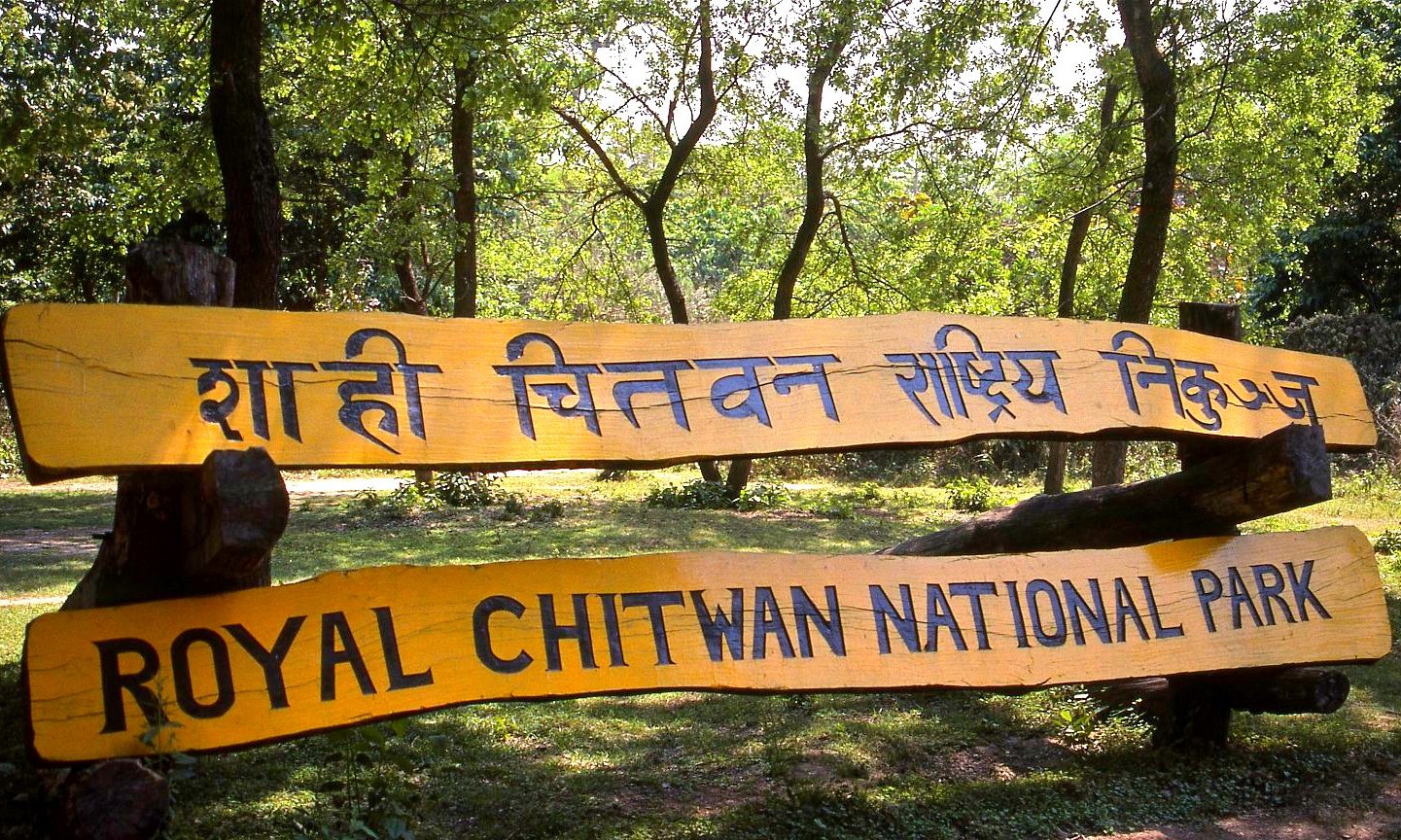
The conservation arc of Chitwan began with the inception of Mahindra Deer Park in 1959. This initiative protected the 175 km2 Tikauli forest, which stretches from the serene Rapti River to the majestic foothills of the Mahabharata. The conservation narrative progressed, and by 1963, the region south of the Rapti River earned recognition as a sanctuary for the endangered rhinos. The culmination of these efforts bore fruit in 1973 when the expansive 932 km2 Royal Chitwan National Park was officially established. Reflecting the political shifts of Nepal, the park shed its "Royal" prefix post the ushering in of people's democracy in 2006 and has since been referred to simply as Chitwan National Park.
In acknowledgment of Chitwan's pivotal role in safeguarding invaluable global biological resources, UNESCO bestowed upon it the honor of a World Heritage Site in 1984. Augmenting the park's protective arc, the Ramsar Site - Beeshazari Lakes and an additional 750 km2 territory were designated as buffer zones in 1996, fortifying Chitwan's stance as a bastion of conservation.
Where is Chitwan National Park? How to get there?
Chitwan National Park is nestled in Nepal's Central Subtropical Inner Terai Lowlands. It spans across portions of the Chitwan, Nawalpur, Parsa, and Makwanpur districts. If you're seeking the main gateway to this biodiversity haven, head to Sauraha Town. Situated 96 kilometers from the park, this town is approximately a five-hour drive from Kathmandu.
For those relying on public transportation, there are ample options. Regular tour buses and micro-vehicles ply this route, with many initiating their journey near Thamel. Upon reaching Sauraha, you'll find private vehicles ready to whisk you to your hotel, ensuring a seamless transition from road to relaxation.
However, if you're tight on time or simply prefer aerial views, consider taking a flight. Kathmandu International Airport offers multiple daily flights to Bharatpur Airport, which is a stone's throw away from Sauraha. With a flight time of just about 20 minutes, it's a quick hop from the bustling capital to the serene landscapes of Chitwan. Once at Bharatpur Airport, both private vehicles and public transport options are readily available to ferry you to Sauraha.
Should you wish for a leisurely journey in a private vehicle or fancy a swift flight, feel free to get in touch with us. We're here to assist with vehicle arrangements or flight tickets, ensuring your journey to Chitwan is both pleasant and memorable
Climate, Geography, and Topography of the Chitwan National Park
Nestled in the lowlands, Chitwan National Park is characterized by a tropical monsoon climate accompanied by pronounced humidity, rendering it predominantly warm. This park presents a mosaic of diverse climates, ensuring that each visit, regardless of the season, offers its unique charm and experience.
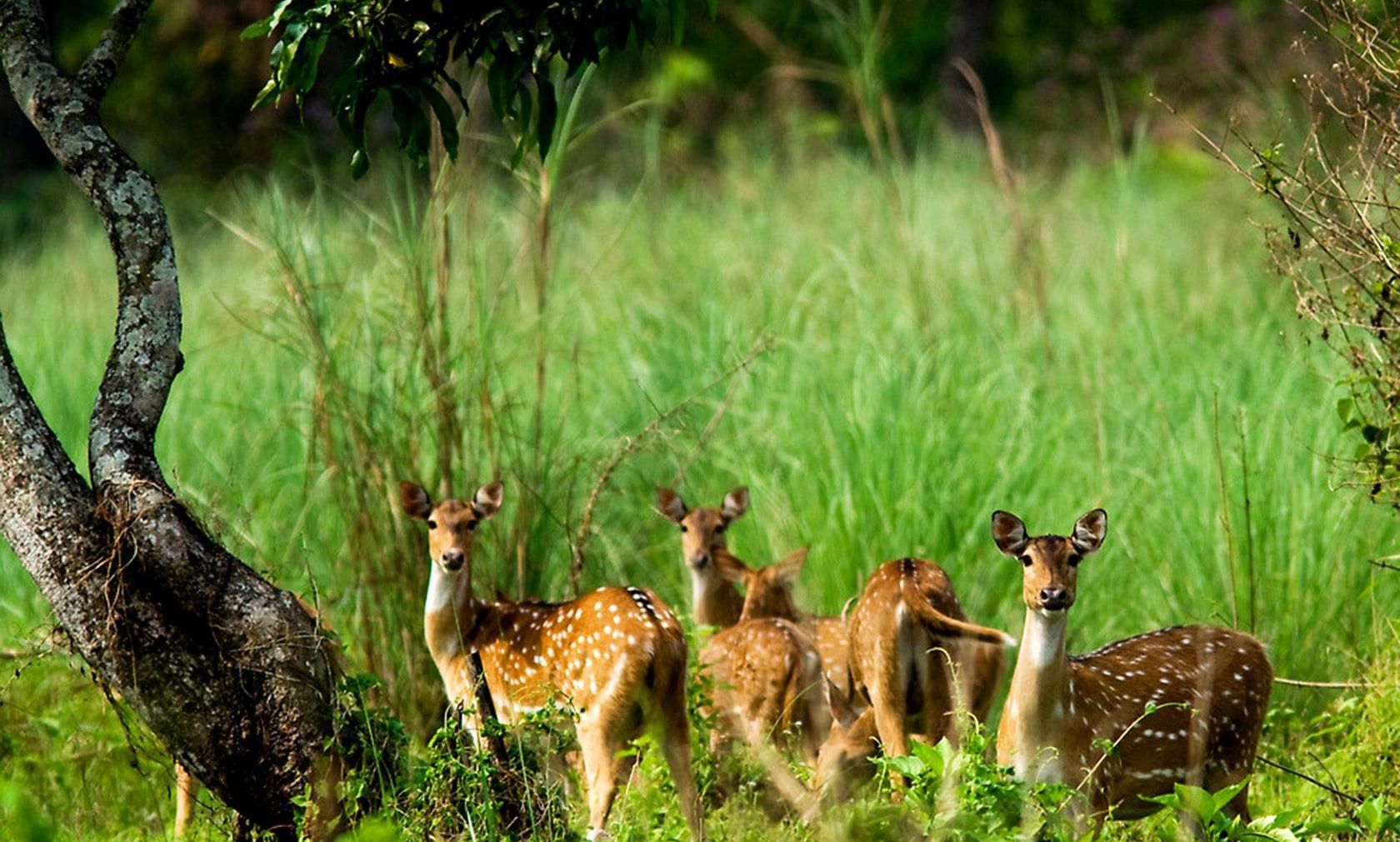
From mid-October to early April, the region remains dry. Days are comfortably warm while nights can bring a fresh chill. Particularly, the span from late December to early February can be brisker. As the calendar advances to April through June, temperatures can soar, occasionally reaching up to ±40°C, interspersed with sporadic rain showers. However, come July, the park welcomes its heavy rainy season, which lingers until September. For those seeking the epitome of Chitwan's beauty, the window from October to December and late February to April is idyllic. During these months, the park basks in a refreshing climate, unveiling its lush green landscapes and breathtaking vistas.
| Climate Zone | Elevation Range | Area % |
| Lower tropical | below 300 m (980 ft) | 58.2% |
| Upper tropical | 301 to 1,000 m (988 to 3,281 ft) | 32.6% |
| Subtropical | 1,001 to 2,000 m (3,284 to 6,562 ft) | 6.7% |
Explore Rich Biodiversity inside Chitwan National Park
Chitwan National Park is nestled on the foot of the Himalayas. You get to explore the varieties of floral and faunal species in Chitwan National Park. The presence of alluvial soil and the riverine forests have made an excellent habitat for the largest population of One-horned Rhinoceros ( Second Largest in the World), the Bengal Tiger, and supports many Endangered species. Chitwan National Park supports rich biodiversity, 544 species of birds ( 61% recorded in Nepal), 126 species of fish (65 % recorded in Nepal), 68 species of mammals, and 56 species of amphibians (herpetofauna). Chitwan National Park is also home to Sloth Bears, Elephants, Leopards, honey badgers, Bengal foxes, spotted linsangs, golden jackals, leopard cats, fishing cats, small Indian civets, crab-eating mongoose, and reptiles like snakes, tortoises, mugger crocodile, gharial crocodile, and many more faunal species.
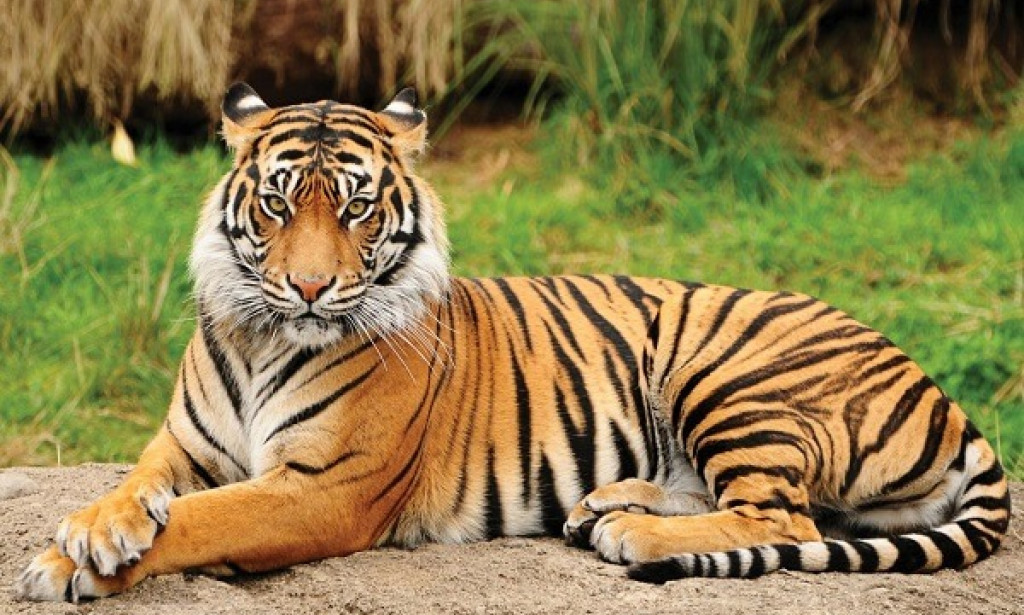
The park is also famous as a Bird-watching destination in the World as the park has the highest concentration of bird species (Over 350 species). The park is home to many endangered birds, namely: The lesser adjutant, Bengal florican, swamp francolin, Grey-crowned Prinia, and many species of grass warbles. The park includes large ecosystems of tropical and sub-tropical deciduous forests predominantly consisting of Sal Trees and grassland extending more than 2,600 square kilometers, which shows a great example of the biological evolution of local species. The various species of plants other than Sal trees including Chir pine, electric, axlewood, beleric, elephant apple, creepers, grey downy balsam, etc., are found in the park. More than 50 species of grasses including, Saccharum ravennae, giant cane, kans grass, khagra reed, etc.
Explore Jungle Safari
Elephant Safari stands out as one of the most exhilarating experiences when journeying through the lush expanses of Chitwan National Park. Perched atop these gentle giants, you'll find yourself weaving through dense forests, getting intimate glimpses of the park's vibrant wildlife. Notable among them are the majestic Bengal Tiger, the elusive Sloth Bear, the iconic One-Horned rhinoceros, and a diverse array of birds, reptiles, and fluttering butterfly species. Guided by the expertise of seasoned Mahouts, you're ensured not just safety, but also an immersive adventure that brings you closer to the wild inhabitants of the park, making your experience both unforgettable and delightful.
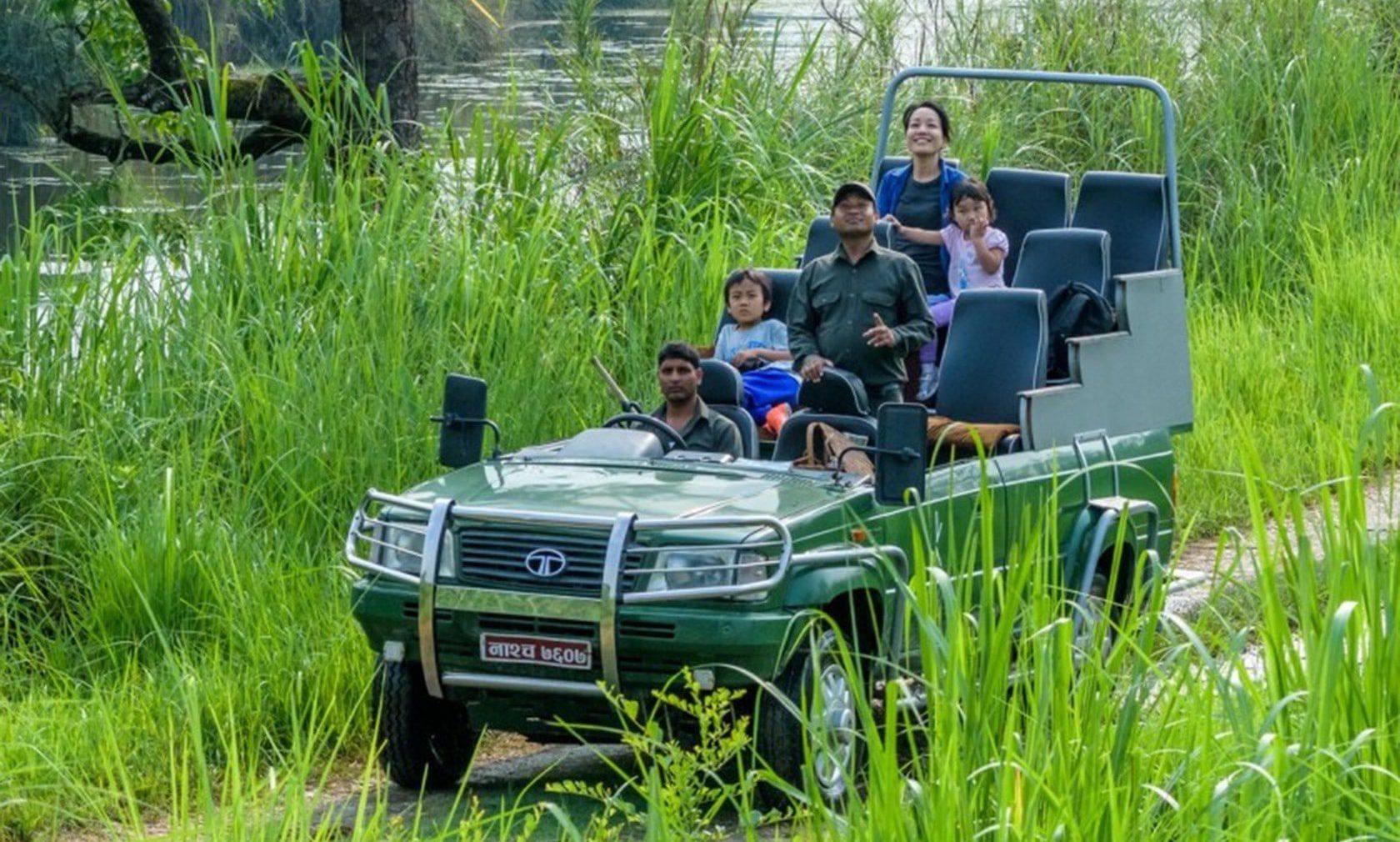
For those who prefer the comfort of four wheels or are traveling in larger groups, the Jeep Safari offers an equally thrilling alternative. Especially for those who might not be keen on riding elephants, the jeep safari promises an extensive exploration of the park's diverse flora and fauna. One of the highlights of this journey includes a visit to the Gharial Crocodile and tortoise breeding center at Kasara. Further enhancing the experience, you'll also get the chance to discover serene lakes peppered throughout the national park, each providing its unique ecosystem and scenic beauty.
Bish Hazari Taal (20 Thousand Lake)
Situated within the sprawling expanse of Chitwan National Park, near the southern edge of Bharatpur, lies the mesmerizing Bish Hazari Taal. This enchanting area is dotted with numerous lakes—both small and large—collectively numbering more than 20,000. An aerial view of the Taal reveals a pattern resembling the numeral 20,000, giving rise to its evocative name, Bish Hazari.
More than just its sheer number, the Taal offers visitors breathtaking vistas replete with diverse birdlife and other wildlife. It's a paradise for ornithologists and nature enthusiasts alike, providing countless opportunities for bird-watching and serene moments of reflection.
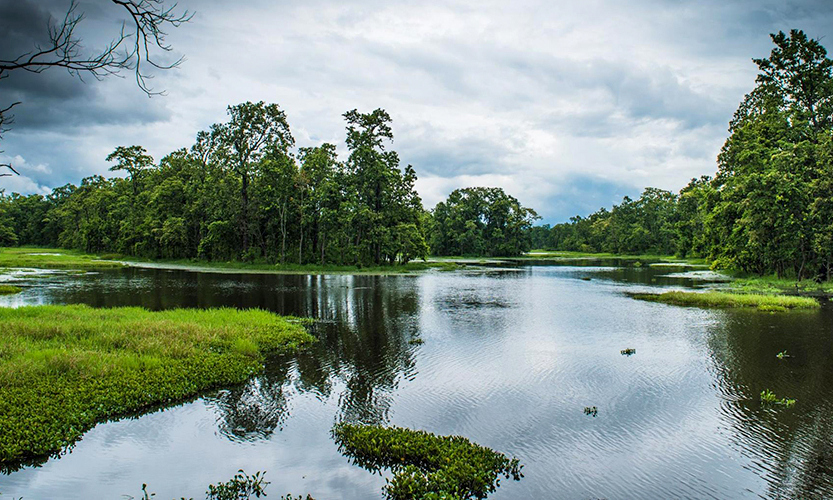
Beyond its avian attractions, the waters of Bish Hazari are home to a significant population of crocodiles and the surrounding areas frequently witness the majestic wanderings of rhinos. For those eager to dive deep into the wonders of this wetland, there are multiple ways to explore. Whether you choose the leisurely pace of cycling or the more encompassing experience of a Jeep Safari, Bish Hazari Taal promises an experience that is both enriching and unforgettable.
Tharu Village Tour
Tharu village in Sauraha, Chitwan, is popular for its culture and traditions. You can witness the lifestyles of the Tharu people on village tours. Tharu museums in The Heart of Bachhauli, Sauraha, offer you the beautiful culture and lifestyles of the Tharu people uniquely. Tharu people have been living close to Chitwan National Park for so long, and their tradition shows a close relationship with the natural world. The tharu cultural program is organized regularly in many hotels at Meghauli and Sauraha.
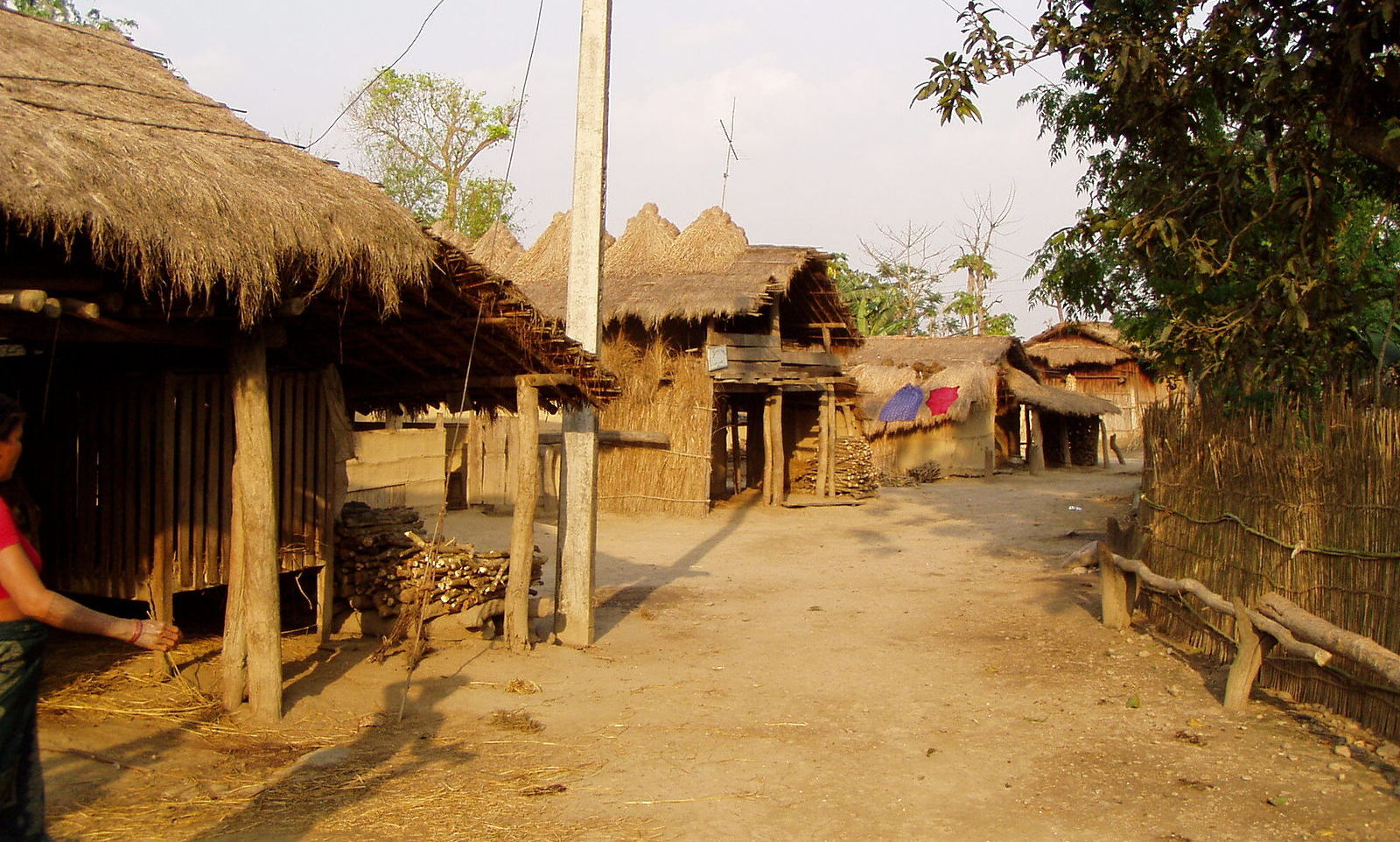
Tharu cultural program includes cultural dance, stick dance ( DandaNache), peacock dance (Mayur Naach), fire dance (Aagni Naach, etc., which is full of entertainment.
The Captivating Walk in Jungle
Immersing oneself in a landscape dominated by lush greenery and dense forests offers an exhilarating and heartwarming adventure. The mesmerizing trek through Sauraha Jungle provides an unparalleled opportunity to intimately connect with the abundant wild flora and fauna of Chitwan National Park. However, while the beauty of the jungle beckons, it's essential to tread with utmost caution. Notably, during these jungle excursions, neither tourists nor guides are permitted to carry any form of weapons, ensuring the pristine nature of this wilderness remains undisturbed.
Enjoy the beautiful Sunsets
After an exhilarating day of safari in Sauraha, Chitwan, there's no better way to wind down than by witnessing the spectacular sunset by the riverside. As the sky paints itself in hues of gold and crimson, take this time to indulge in the tantalizing local street foods, and amble around Sauraha, and capture these mesmerizing moments through your lens.
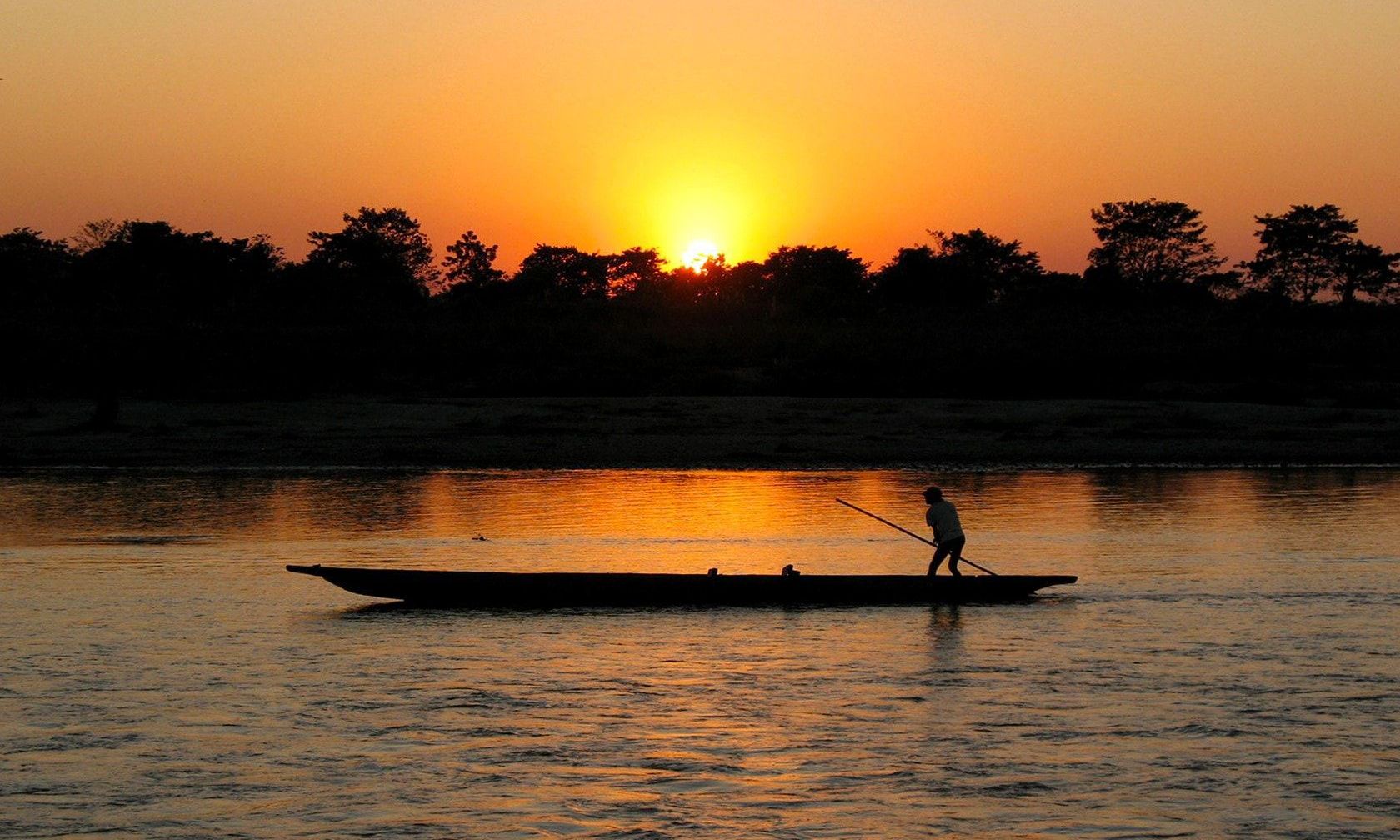
Discover Unique Breeding and Training Centers
The Elephant/Vulture/Gharial Crocodile and Turtle-Breeding Center is the epitome of conservation efforts in Chitwan. But an even more specialized center, the Elephant Breeding and Training Centre, Khorsor, is a mere 10-minute drive from Abraha. Established in 2044 B.S. (1985), its goal has been the augmentation of the elephant population. This center stands out as there are only a handful of such facilities globally, making your visit here truly distinctive and memorable. Inside the park's bounds, the Elephant Breeding Center offers heartwarming sights of mother and calf elephants, providing perfect photo opportunities. Here, you can also delve into the commendable endeavors put forth to boost the elephant numbers.
Canoe Rides
Canoe rides in Chitwan National Park offer a serene and immersive experience in the heart of nature. Drifting along the tranquil waters of the park's rivers and lakes, you navigate through pristine landscapes, surrounded by lush greenery and the symphony of bird calls. From the safety of your canoe, you can observe a myriad of aquatic life, including crocodiles, turtles, and colorful bird species that call the park their home. The canoe ride in Chitwan National Park provides a peaceful and enchanting journey that allows you to connect intimately with the park's captivating waterways and wildlife.
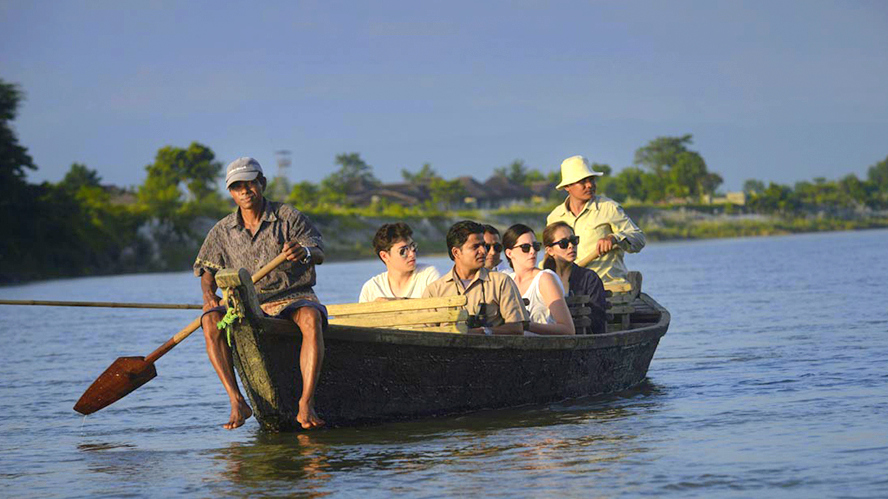
Vulture Breeding Centre
The Vulture Breeding Centre in Chitwan was established in 2008 to increase the vulture population. You can explore the critically endangered vulture species: slender-billed and oriental black-backed vultures.
Crocodile Breeding Centre
Crocodile Breeding Centre in Kasara lies in the center of dense forests, Kasara, which was established in 1978. It was established to protect gharial crocodiles, where the natural eggs of the Gharial crocodiles are kept in artificial conditions to hatch eggs. The young crocodiles are kept until they are released into the rivers to increase their populations.
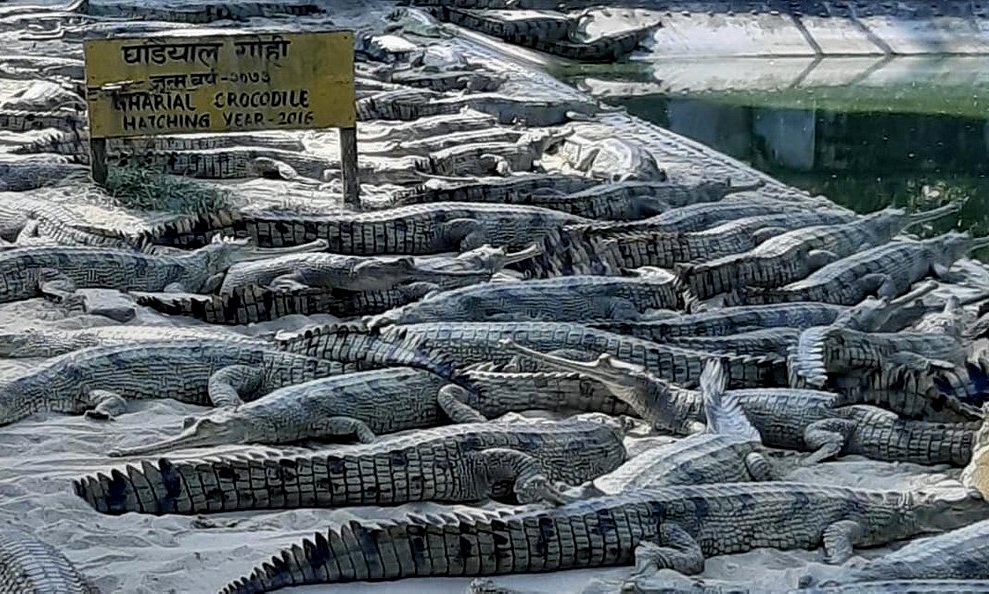
The delightful views of Crocodiles from egg to giant in Crocodile Breeding centers will make your visit worthwhile.
Besides this, there is a Tortoise Breeding Center as well, established to increase the Tortoise population.
More Highlights of Chitwan National Park Safari
- Rich Biodiversity Exploration: Dive deep into the heart of Chitwan National Park and marvel at its abundant flora and fauna.
- A Journey Back in Time: As the oldest national park in Nepal, established in 1973, Chitwan holds a special place in the country's conservation history.
- Unique Conservation Initiatives: Get up close with the efforts at the Elephant/Gharial Crocodile/Vulture Breeding Centre and witness firsthand the steps taken to preserve and grow the numbers of these majestic creatures.
- Witness Rare Species: Be on the lookout for the One-Horned Rhinoceros, Gharial Crocodile, and the elusive Royal Bengal Tigers.
- Thrilling Elephant Ride: Experience Chitwan like never before atop one of these gentle giants during an Elephant Ride.
- Adventurous Jeep Safari: Traverse the park's terrains in a Jeep, making a pit stop at the expansive 20 Hajari Taal.
- Embrace Local Traditions: Dive into the heart of the Tharu village, get a taste of their daily life, and immerse yourself in their vibrant culture and traditions.
- Jungle Treks: The Captivating Walk in the Jungle lets you feel the heartbeat of the forest and its countless mysteries.
- Serene Canoe Rides: Float peacefully on the waters within Chitwan National Park, absorbing the natural sounds and sights around.
- Bird Enthusiast's Paradise: With its diverse avian population, Chitwan is a haven for bird-watching enthusiasts.
- Sunset by the Riverside: Wrap up the day with a mesmerizing sunset at Sauraha, capturing the golden hues and the tranquil moments.
Your journey through Chitwan promises to be a potpourri of adventure, nature, and culture, making it a must-visit destination for every nature lover.
Facilities and services in and outside the Chitwan National Park
There is a Museum at Kasara- The HQ of the Park has lots of things to collect information about the park and the culture. Nearby also have Bikram Baba Temple. About 1km far from HQ, there is the Gharial Breeding Centre where Endangered Gharial Crocodile Eggs are hatched. There are also many Turtles and marsh Muggers.
The park is one fully facilitated protection area. For any information, the Visitors Center at Saurah provides fascinating information about wildlife conservation programs. There are varieties of handicrafts and other local products for gifts and souvenirs that you can buy at the Women’s user group Souvenir Shop.
Jungle Safari and nature walks provide an opportunity to get a closer view of the endangered- Horned Rhinoceros and the lucky one may be the Royal Bengal tiger. The Elephant Breeding Centre at Khorsor, Sauraha, where you can see baby elephants and domestic elephants can also enjoy elephant baths.
Inside the park has 7 Resorts run by the park concessionaires. There are also many lodges and guest houses outside the park. You can find deluxe and luxurious hotels and Resorts around Chitwan. It is best for the family tour and the couple tour. Visiting Chitwan National Park is best for those seeking a luxurious vacation. One can enjoy nature, wildlife and can experience the Tharu Culture, their foods, and beverages, etc.
Luxury Holidays Nepal offers Luxury tours in Nepal, Religious and Spiritual Tours, Cultural and Historical Tours, Helicopter Tours, Adventure Sports tours, Jungle Safari tours in Nepal, and many more.
If you need any further information, please contact us by email: [email protected], Phone: +977- 985 100 5129 (WhatsApp)
#Tags
Tripadvisor
5.0974 reviewsGoogle
4.8123 reviewsFacebook
4.1 recommend44 ReviewsTrustpilot
4.1 Great(5 reviews)- Trusted by50K plus traveller

